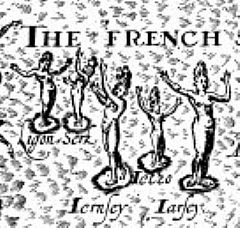Ever-happie Iles: Michael Drayton's Poly-olbion
The sprightly Muse her wing displays. And the French islands first surveys—Drayton's poetic description of Britain, written in 1612, opens with the Channel Islands. This is the 1813 rendition into modern English by Robert Southey. The Library has a facsimile of the 1622 edition, published for the Spenser Society in 1889.

From The First Song.
Thus scarcely said the Muse, but hovering while she hung
Upon the Celtic wastes, the sea-nymphs loudly sung:
'O ever-happy isles! your heads so high that bear,
By nature strongly fenc'd, which never need to fear
On Neptune's wat'ry realms when Eolus raiseth wars
And every billow bounds, as though to quench the stars:
Fair Jersey first of these here scatter'd in the deep
.Peculiarly that boasts thy double-horned sheep:
Inferior nor to thee, thou Guernsey, bravely crown'd
With rough-embattled rocks, whose venom-hating ground
The hardened emeril¹ hath, which thou abroad dost send:
Thou Ligon her belov'd, and Serk, that doth attend
Her pleasure every hour; as Jethow, them at need,
With pheasants, fallow deer, and conies that dost feed:
Ye seven small sister isles, and Sorlings, which to see
The half-sunk seaman joys; or whatsoe'er you be,
From fruitful Aurney, near the ancient Celtic shore,
To Ushant and the Seams, whereas those nuns of yore
Gave answers from their caves, and took what shapes they please:
Ye happy islands set within the British seas,
With shrill and jocund shouts, th' unmeasur'd deeps awake.
And let the gods of sea their secret bow'rs forsake,
Whilst our industrious Muse great Britain forth shall faring,
Crown'd with those glorious wreaths that beautify the spring;
And whilst green Thetis' nymphs, with many an amorous Lay
Sing our invention safe unto her long-wisht bay.'
¹ Emery-stone.
